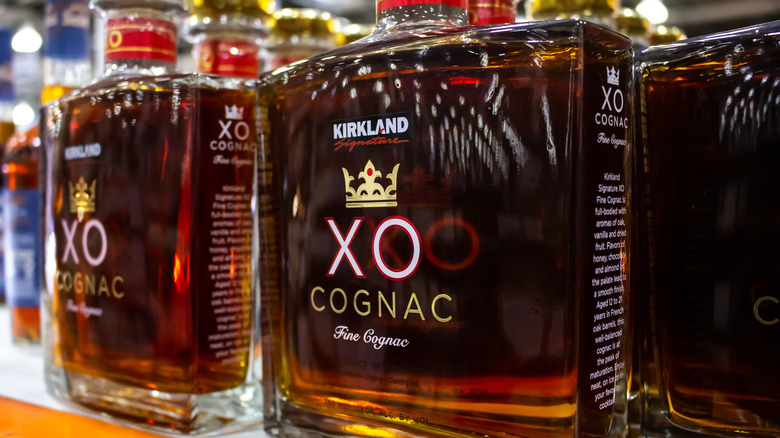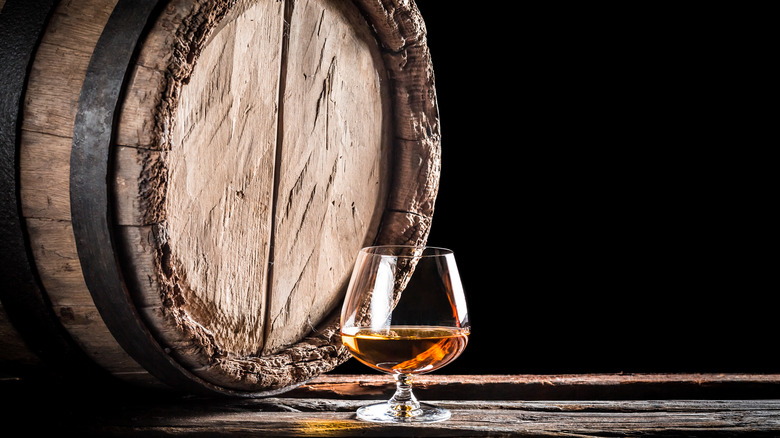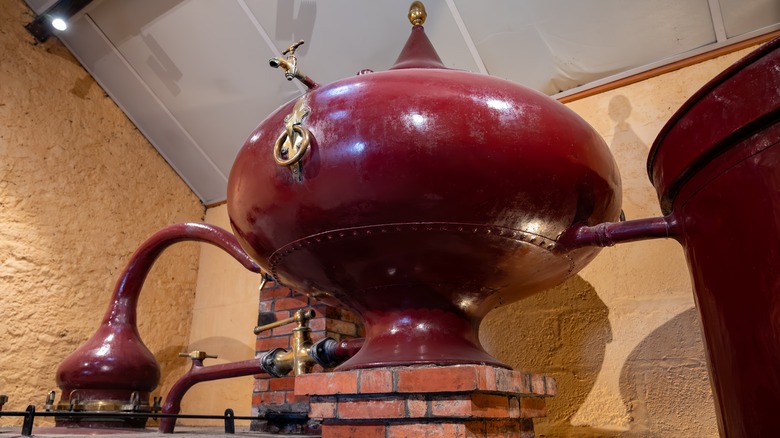What Company Is Behind Costco's Kirkland Brand Cognac?
Costco's Kirkland brand has built a reputation as a maker of quality grocery items, including its wide array of alcohol. From Kirkland brand bargain wines and craft beer to a variety of hard liquors, the bulk retailer's private label produces a large number of generally well-reviewed adult beverages (with the exception of Kirkland light beer which was a complete failure). Costco doesn't make the alcohol but sources it from various beverage companies, some of which are well-known in the industry (like the Sazerac company which makes Kirkland's spiced rum). Sometimes, it's a mystery who the distributor is behind the liquor since it's not always printed on the bottle. As for Kirkland's XO Cognac, the label indicates that Peyrat-Associés & CIE is the company that makes the fine spirit.
The French, family-owned company operates as Maison Peyrat and are the makers of various Peyrat Cognacs, including their XO Cognac, a blend of spirits aged a minimum of 15 years. Kirkland's XO Cognac is similar in appearance to Peyrat's bottle and consists of a blend aged between 12 and 21 years. Both are 40% alcohol by volume, while Kirkland's bottle is slightly larger at 750 ml compared to Peyrat's 700 ml. Kirkland's cognac is also significantly cheaper, at under $50, while Peyrat's award-winning XO is typically over $100.
Background of Maison Peyrat
The Peyrat family began distilling wine and spirits in Southwest France in the early 1920s. Henri Peyrat (1885 to 1969), the founder of the company, was an esteemed négociant (wine merchant) in the region who built a reputable business for over 30 years. As of today, four generations of Peyrats have held roles in the company, including overseeing it's expansion into foreign markets such as Finland, Sweden, Norway, Denmark, Russia and the United States. The company currently produces a variety of cognac blends and single vineyard or single estate vintages. While cognac has traditionally been made from a blend of grapes grown in different regions in Southwest France, single vineyard cognacs — cognacs made with grapes from a single estate — have debuted in the past couple of decades.
It's rumored that Maison Peyrat has a connection with master blender/cellar master and owner of Prunier Cognac, Stéphane Burnez, although it's unclear exactly what that association is. As far as accolades, Peyrat Cognac XO was a gold medal winner in the 2021 London Spirits Competition and a gold medal winner in the 2021 International Spirits Challenge tasting awards. Their cognac is made with Ugni blanc grapes, the signature white grape variety used to make cognac and dry white wines. The cognac is aged for several years in oak casks that produce different tastes and characteristics depending on the type of wood the barrel is made from.
How is cognac made
Cognac is a type of brandy named for the region where it is made, Cognac, France. Makers of cognac must follow specific rules under the Appellation d'Origine Contrôlée (AOC) which translates to "controlled destination of origin". Cognac is made from certain white grape varieties, distilled twice in copper stills, and aged in barrels made of specific types of French oak. Most cognacs are blends of multiple vintages, young spirits mixed with old spirits. Both cognac and wine are made from grapes, however, cognac is distilled, making it much stronger than regular wine (cognacs are typically 40% alcohol by volume, 80 proof).
There are different designations for how long a cognac has been aged: XO (Extra Old), a minimum of 10 years; VSOP, (Very Special Old Pale), a minimum of 4 years; and VS, (Very Special), a minimum of 2 years. In 2018, XXO, (Extra, Extra, Old), debuted as a designation for cognac aged at least 14 years.
Kirkland's XO cognac is described by cognac expert as having a warm amber color, fresh notes of citrus and apricot on the nose, apricot with hints of honey, chocolate and almond on the palate, and a lightly spiced finish. It appears to have a more fruity, citrusy aroma and taste compared to Peyrat's XO which is described as having hazelnut and buttery notes and a lightly toasted finish.


